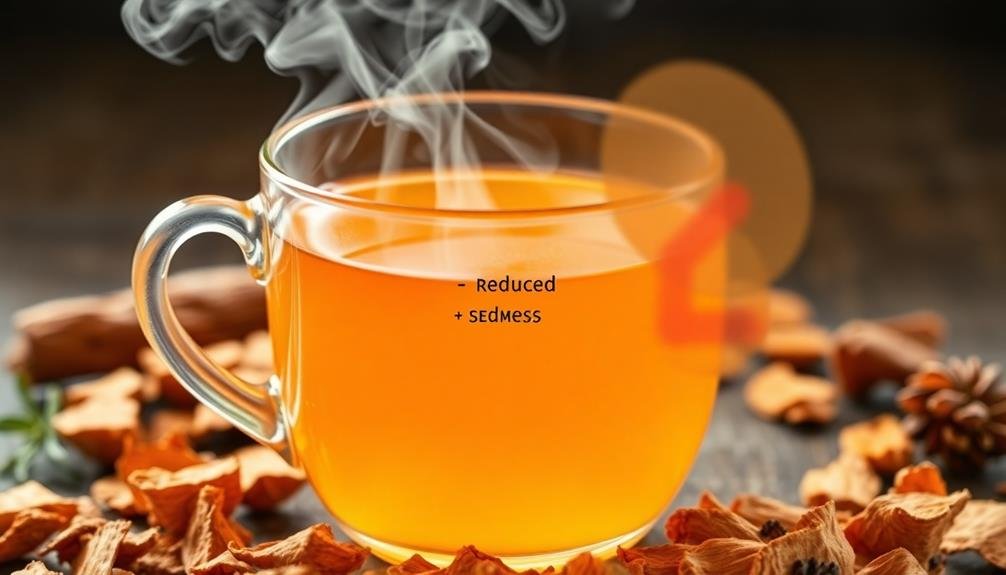Slippery elm bark tea benefits digestion through its unique blend of mucilage, tannins, and antioxidants. You'll find that the mucilage forms a protective coating in your digestive tract, soothing inflammation and irritation. It acts as a prebiotic, nourishing beneficial gut bacteria and promoting overall gut health. The tea can help manage both constipation and diarrhea by regulating bowel movements. It's also effective in reducing acid reflux and heartburn symptoms. With its ability to enhance nutrient absorption and support immune function, slippery elm bark tea offers a natural approach to improving your digestive wellness. Discover how this ancient remedy can revolutionize your gut health.
Origins of Slippery Elm Bark

Originating in North America, slippery elm bark has been used for centuries by Native American tribes for its medicinal properties. The bark comes from the slippery elm tree, scientifically known as Ulmus rubra, which is native to eastern and central North America.
You'll find these trees growing in moist, upland forests and along streams, reaching heights of up to 60-80 feet.
The inner bark of the slippery elm tree is the part used for medicinal purposes. It's harvested in spring when the sap is rising and the bark easily peels away from the tree.
Native Americans discovered its healing properties and used it for various ailments, including digestive issues, wounds, and sore throats.
European settlers quickly adopted the use of slippery elm bark after learning about its benefits from indigenous peoples. They incorporated it into their own medical practices, and it became a staple in early American medicine.
Today, you can find slippery elm bark in various forms, including powders, capsules, and teas, all derived from this historically significant tree.
Chemical Composition and Properties
Slippery elm bark's unique properties stem from three main components: mucilage, tannins, and antioxidants. When you brew slippery elm bark tea, you're extracting these beneficial compounds, which work together to soothe and protect your digestive system.
Mucilage, a gel-like substance, forms a protective coating on your stomach and intestinal lining. This coating helps reduce irritation and inflammation, while also slowing down the absorption of nutrients. It's this soothing effect that makes slippery elm bark tea so effective for digestive issues.
Tannins, found in abundance in slippery elm bark, have astringent properties. They help tighten and tone tissues in your digestive tract, potentially reducing excess secretions and improving overall gut health. These compounds may also have mild antimicrobial effects, supporting your body's natural defenses against harmful bacteria.
Antioxidants in slippery elm bark tea combat free radicals in your body, potentially reducing oxidative stress and inflammation. This can contribute to better overall digestive health and may even support your immune system.
The combination of these components creates a powerful, natural remedy for various digestive concerns, making slippery elm bark tea a popular choice for those seeking relief from gastrointestinal discomfort.
Soothing Effect on Digestive Tract

Slippery elm bark tea's mucilage coats your stomach lining, providing a protective barrier against irritation.
This coating action helps reduce inflammation in your digestive tract, soothing sensitive tissues.
You'll likely experience relief from various digestive discomforts, including heartburn, acid reflux, and stomach upset.
Mucilage Coats Stomach Lining
When consumed, slippery elm bark tea releases a gel-like substance called mucilage, which coats the lining of your stomach and intestines. This protective layer acts as a barrier between your digestive tract and potential irritants, helping to reduce inflammation and soothe discomfort.
The mucilage's slippery texture allows it to adhere to the stomach and intestinal walls, creating a temporary shield that can last for several hours. As the mucilage coats your stomach lining, it helps to neutralize excess stomach acid, which can be particularly beneficial if you suffer from acid reflux or heartburn.
This coating also slows down the digestion process, allowing your body more time to absorb nutrients from food. Additionally, the mucilage can help bulk up stool, making it easier to pass and potentially alleviating constipation.
The protective properties of slippery elm bark tea's mucilage extend beyond just coating the stomach. It can also help soothe irritation in the throat and esophagus, making it an excellent remedy for sore throats or coughs.
Reduces Inflammation and Irritation
One of the most significant benefits you'll experience from drinking slippery elm bark tea is its powerful anti-inflammatory effect on your digestive tract. This soothing property can help alleviate various gastrointestinal issues, including:
- Irritable bowel syndrome (IBS)
- Inflammatory bowel disease (IBD)
- Acid reflux and heartburn
The tea's anti-inflammatory compounds work to reduce irritation in your stomach and intestines, providing relief from discomfort and pain. By calming inflamed tissues, slippery elm bark tea can help restore balance to your digestive system and promote healing.
You'll find that regular consumption of this tea can decrease the frequency and severity of digestive flare-ups. It's particularly effective in soothing the burning sensation associated with acid reflux and GERD. The tea's ability to coat and protect the esophagus helps prevent further irritation from stomach acid.
Moreover, slippery elm bark tea can help reduce inflammation throughout your entire digestive tract, from your mouth to your colon. This thorough anti-inflammatory action supports overall digestive health and can contribute to improved nutrient absorption and regular bowel movements.
Alleviates Digestive Discomfort
Beyond its anti-inflammatory properties, slippery elm bark tea offers a soothing effect that can alleviate various forms of digestive discomfort. When you drink this tea, it forms a protective coating along your digestive tract, providing relief from symptoms like heartburn, acid reflux, and stomach ulcers. This mucilage-like substance acts as a barrier, shielding sensitive tissues from irritants and stomach acid.
You'll find that slippery elm bark tea can help calm an upset stomach and reduce nausea. It's particularly beneficial if you're experiencing indigestion or bloating after meals. The tea's gentle nature makes it suitable for those with sensitive stomachs or chronic digestive issues.
Moreover, slippery elm bark tea can assist in regulating bowel movements. If you're dealing with constipation, it can help soften stools and promote easier passage. Conversely, if you're experiencing diarrhea, it can help firm up loose stools by absorbing excess water in the intestines.
Prebiotic Benefits for Gut Health
How does slippery elm bark tea support a healthy gut microbiome? This herbal tea acts as a prebiotic, nourishing the beneficial bacteria in your digestive system. When you drink slippery elm bark tea, you're providing food for these good bacteria, which helps them thrive and multiply.
The prebiotic benefits of slippery elm bark tea come from its high content of mucilage, a type of soluble fiber. This mucilage:
- Isn't digested by your body
- Passes through to your colon
- Becomes fermented by gut bacteria
As gut bacteria ferment the mucilage, they produce short-chain fatty acids (SCFAs).
These SCFAs play an essential role in maintaining gut health by reducing inflammation, strengthening the intestinal barrier, and supporting immune function.
Inflammation Reduction in Stomach

If you're dealing with stomach inflammation, slippery elm bark tea can offer relief.
This natural remedy works by coating and soothing your irritated stomach lining, providing a protective barrier.
As a result, you'll experience a calming effect on your digestive system, reducing overall inflammation and discomfort.
Soothing Irritated Stomach Lining
One of the most significant benefits of slippery elm bark tea is its ability to soothe an irritated stomach lining.
This powerful herbal remedy works by creating a protective layer over the inflamed tissue, providing relief from discomfort and promoting healing.
When you drink slippery elm bark tea, you're introducing a natural mucilage into your digestive system that coats and calms irritated areas.
The soothing properties of slippery elm bark tea can help with various digestive issues, including:
- Acid reflux and heartburn
- Gastritis and stomach ulcers
- Inflammatory bowel diseases like Crohn's and ulcerative colitis
Calming Digestive System Inflammation
Reducing inflammation in the digestive system is another key benefit of slippery elm bark tea. This herbal remedy contains compounds that can help calm irritated tissues throughout your gastrointestinal tract. When you drink slippery elm bark tea, it forms a protective coating on the lining of your stomach and intestines, which helps reduce inflammation and promotes healing.
The anti-inflammatory properties of slippery elm bark can provide relief for various digestive issues. Here's a breakdown of how it affects different conditions:
| Condition | Inflammation Reduction | Symptom Relief |
|---|---|---|
| Gastritis | Moderate to High | Reduced pain and burning |
| IBS | Moderate | Less cramping and bloating |
| Ulcerative Colitis | Moderate | Decreased urgency and discomfort |
| Crohn's Disease | Mild to Moderate | Potential reduction in flare-ups |
| GERD | Mild | Possible decrease in acid reflux |
Acid Reflux and Heartburn Relief
Slippery elm bark tea can come to the rescue for those suffering from acid reflux and heartburn. Its mucilage content forms a protective coating along your esophagus and stomach lining, reducing irritation caused by stomach acid. This natural barrier helps alleviate the burning sensation associated with these conditions.
When you drink slippery elm bark tea, you'll experience:
- A soothing effect on inflamed tissues
- Reduced frequency of acid reflux episodes
- Decreased severity of heartburn symptoms
The tea's ability to neutralize stomach acid contributes to its effectiveness in managing acid reflux and heartburn. It's particularly helpful when consumed before meals or at bedtime when symptoms often worsen.
Unlike some over-the-counter medications, slippery elm bark tea doesn't interfere with your body's natural digestive processes.
Regular consumption of this tea can lead to long-term improvements in your digestive health. It's a gentle, natural approach to managing acid reflux and heartburn without the potential side effects of prescription medications.
Remember to consult your healthcare provider before incorporating slippery elm bark tea into your routine, especially if you're taking other medications or have underlying health conditions.
Constipation and Diarrhea Management

Slippery elm bark tea can help regulate your bowel movements, addressing both constipation and diarrhea.
Its mucilage content coats and soothes your digestive tract, reducing inflammation and promoting healthier digestion.
You'll find that this natural remedy may ease discomfort and promote more regular, comfortable bowel movements.
Regulates Bowel Movements
One of the most notable benefits of slippery elm bark tea is its ability to regulate bowel movements. This natural remedy works by forming a protective layer along your digestive tract, which can help normalize stool consistency and frequency.
Whether you're dealing with constipation or diarrhea, slippery elm bark tea can offer relief.
For those struggling with constipation, slippery elm bark tea acts as a gentle laxative. It increases the bulk of your stool and promotes smoother passage through your intestines.
If you're experiencing diarrhea, the tea's mucilage content helps absorb excess water in your digestive system, firming up loose stools.
Slippery elm bark tea can help regulate your bowel movements by:
- Soothing irritated intestinal walls
- Promoting healthy gut bacteria growth
- Reducing inflammation in your digestive tract
Soothes Digestive Tract
A key benefit of slippery elm bark tea is its ability to soothe the digestive tract, particularly when managing constipation and diarrhea. When you drink this tea, its mucilage content forms a protective coating along your intestinal walls, reducing inflammation and irritation.
For constipation relief, slippery elm bark tea acts as a gentle laxative. It softens your stool and lubricates the intestinal passage, making bowel movements easier and less painful. In cases of diarrhea, the tea's astringent properties help firm up loose stools and reduce frequency.
Here's how slippery elm bark tea affects your digestive tract:
| Condition | Effect on Intestines | Effect on Stool | Symptom Relief |
|---|---|---|---|
| Constipation | Lubricates passage | Softens | Easier passing |
| Diarrhea | Reduces inflammation | Firms up | Less frequent |
The tea's soothing properties can also help alleviate other digestive issues like heartburn, acid reflux, and stomach ulcers. By creating a protective barrier, it reduces contact between stomach acid and the sensitive lining of your esophagus and stomach, providing relief from discomfort and promoting healing.
Preparation Methods and Dosage
Several methods exist for preparing slippery elm bark tea, each with its own recommended dosage. The most common approach involves steeping powdered bark in hot water. You'll typically use 1-2 teaspoons of powder per cup of water, letting it steep for about 5 minutes before straining. For a stronger brew, you can simmer the mixture for 10-15 minutes.
If you're using slippery elm bark capsules, follow the manufacturer's instructions, usually taking 1-2 capsules 3-4 times daily. For lozenges, sucking on 1-2 pieces as needed is generally recommended.
When preparing slippery elm bark tea, keep these tips in mind:
- Always use cool or room temperature water to mix the powder initially, preventing clumps.
- Stir thoroughly before adding hot water to guarantee even distribution.
- Consider adding honey or cinnamon to improve the taste.
Start with a lower dosage and gradually increase it as needed. It's best to consume slippery elm bark tea between meals for maximum absorption.
If you experience any adverse effects, reduce the dosage or consult a healthcare professional. Remember, while slippery elm bark is generally safe, it's always wise to discuss its use with your doctor, especially if you have existing health conditions or take medications.
Potential Side Effects

While slippery elm bark tea is generally safe for most people, it's not without potential side effects. You should be aware of possible allergic reactions, especially if you're sensitive to elm trees or related species. Some individuals may experience nausea, bloating, or skin irritation.
If you're pregnant or breastfeeding, consult your healthcare provider before consuming slippery elm bark tea. It may interfere with the absorption of certain medications, so take it separately from other drugs.
Here's a quick reference table for potential side effects and precautions:
| Side Effect | Precaution |
|---|---|
| Allergic reactions | Test a small amount first |
| Nausea and bloating | Reduce dosage or discontinue use |
| Skin irritation | Stop use and consult a doctor |
| Medication interference | Take 2 hours before or after other drugs |
| Pregnancy concerns | Consult healthcare provider |
Combining With Other Digestive Herbs
Moving beyond potential concerns, let's explore how you can enhance the digestive benefits of slippery elm bark tea by combining it with other herbs. Pairing slippery elm with complementary digestive herbs can create a powerful synergy, potentially amplifying its soothing effects on your gastrointestinal system.
Consider blending slippery elm bark tea with these digestive powerhouses:
- Peppermint: Known for its ability to ease bloating and reduce stomach discomfort
- Ginger: Helps alleviate nausea and promotes healthy digestion
- Marshmallow root: Shares similar mucilaginous properties with slippery elm, further coating and protecting the digestive tract
When combining herbs, start with small amounts to gauge your body's response. You can create custom blends by mixing equal parts of dried herbs or using pre-made tea bags.
Steeping times may vary, so follow individual herb recommendations or steep for 5-10 minutes as a general rule.
Frequently Asked Questions
Can Slippery Elm Bark Tea Help With Weight Loss?
You might find slippery elm bark tea helpful for weight loss. It can reduce appetite and slow digestion, making you feel full longer. However, it's not a miracle solution and should be combined with a healthy diet and exercise.
Is Slippery Elm Bark Tea Safe During Pregnancy?
You should consult your doctor before drinking slippery elm bark tea during pregnancy. While it's generally considered safe, there's limited research on its effects. It's best to err on the side of caution when you're expecting.
How Long Does It Take to Feel the Effects of Slippery Elm?
You'll typically feel slippery elm's effects within 30 minutes to an hour after consumption. It coats your digestive tract quickly, providing relief from various symptoms. However, individual experiences may vary depending on your specific condition and dosage.
Can Children Drink Slippery Elm Bark Tea?
You shouldn't give slippery elm bark tea to children without consulting a pediatrician first. It's generally safe for adults, but there's limited research on its effects in kids. Always err on the side of caution with herbal remedies.
Does Slippery Elm Bark Tea Interact With Any Medications?
Yes, slippery elm bark tea can interact with medications. You shouldn't drink it within two hours of taking other drugs. It may affect how your body absorbs certain medicines, so always consult your doctor before using it.
In Summary
You've now learned how slippery elm bark tea can benefit your digestion. From its soothing effects on the digestive tract to its prebiotic properties, this natural remedy offers multiple advantages. Remember to prepare it correctly and be aware of potential side effects. If you're dealing with digestive issues, you might want to give slippery elm bark tea a try. It's a simple, yet potentially effective way to support your gut health.





Leave a Reply